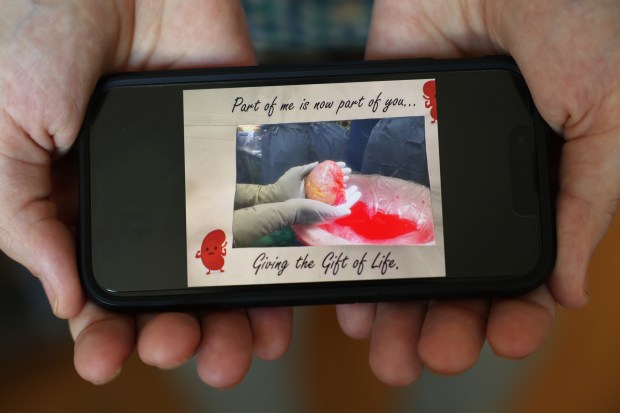John Nicholas’ favorite karaoke song is “When You Were Young” by The Killers. He remembers hearing it at the beginning of his surgery and singing it on the operating table.
That’s because Nicholas, 28, was awake during his kidney transplant at Northwestern Medicine, a first for the hospital.
Nicholas, who received regional anesthesia, could hear what the transplant team was saying around him, but most of the time it felt like there was “a lot of noise, movement and lights,” he said.
A Chicago resident originally from a northern suburb of Indianapolis, Nicholas was diagnosed nearly two decades ago with Crohn’s disease, a type of inflammatory bowel disease that irritates the lining of the digestive tract. Nicholas began treatment and eventually got the disease under control, but he struggled with flare-ups for years.
In 2013, blood tests revealed that his kidneys were malfunctioning. A biopsy revealed inflammation of the kidneys and he was started on anti-inflammatory medication, which helped bring the situation under control.
A few years later, when Nicholas was a sophomore in college, he suffered another bout of kidney inflammation, which further damaged his kidneys. It was clear that he would need a kidney transplant.
About two years ago, Nicholas contacted the Northwestern transplant team. He was placed on the waiting list, but he was also given a questionnaire to send to all potential living donors who wanted to be evaluated for donation.
Nicholas’ mother completed the paperwork and was approved to be his donor, but she was diagnosed with early-stage breast cancer in December 2023, just before her scheduled transplant date. Although her cancer treatment was successful, she was no longer an option to donate her kidney.
“The news came while I was home in Indianapolis for the holidays, surrounded by family and my group of friends,” Nicholas said.
He eventually spoke to one of his childhood friends, Patrick Wise, 29, about becoming a donor.
“He had already seriously considered it when I first sent out the questionnaire, before we decided to donate my mother,” Nicholas said. “Luckily, it didn’t take long for Patrick to get the go-ahead to donate blood after my mother was declared ineligible, and he was very motivated to do it for me.”

In March, the transplant was scheduled for May 24. Nicholas prepared for surgery with the transplant team and Wise, who now lives in Alexandria, Virginia, and was flying back and forth for pre-op appointments.
Dr. Satish Nadig, chief of transplant surgery and director of Northwestern’s Comprehensive Transplant Center, and Dr. Vinayak Rohan, transplant surgeon and surgical director of kidney transplantation at Northwestern, were both part of Nicholas’ transplant team.
Nadig said the team reached out to Nicholas before the surgery to discuss his options. Since Nicholas was a good candidate for awake surgery, given his age and overall good health, Nadig said the team talked to him about the benefits of the procedure and also let him know that the risks were minimal.
“When we first met John, we found out he was very curious, very inquisitive,” Nadig said. “In fact, during the surgery, he wanted to see the kidney as we were putting it in, and we were able to show him.”
Although general anesthesia used in many surgeries is “very safe,” Rohan said there is a subset of patients for whom general anesthesia carries a higher risk, due to breathing problems, age or other issues.
Some patients can have successful surgery under regional anesthesia, where only the area of the body being operated on is anesthetized and the patient remains awake. In Nicholas’ case, he underwent spinal anesthesia, a form of regional anesthesia that is also less invasive and can lead to a faster recovery time.
“If you think about it this way, the less invasive a procedure is, the better it is for the patient,” Rohan said.
Nadig compared having a patient under spinal anesthesia to having a cesarean section.
“Kidney transplants have been working for decades, but we want to constantly work to improve them and make them even better,” Nadig said. “It’s amazing to think that you can get a life-saving organ, have surgery and go home the next day.”
Rohan said the national average hospital stay after a kidney transplant is five to seven days and typically two to three days at Northwestern, but because of the use of regional anesthesia, Nicholas was discharged within 24 hours after major surgery.
Nadig said Nicholas’ kidney failure was “immediately cured” with a new, fully functioning kidney. Aside from managing some mild discomfort with over-the-counter painkillers, Nadig said Nicholas did not use opioid painkillers after surgery, another benefit of reduced anesthesia.
After the successful operation, the team hopes to perform more awake procedures and help more people.
“I think this is an exciting new chapter, and I think it’s going to open the door for a lot of new people to get a kidney transplant and it’s also going to improve our whole kidney transplant process and the patient experience,” Rohan said.
“It seemed like a no-brainer,” Nicholas said of participating in Northwestern’s first awake kidney transplant. He said his recovery went “extremely well” and he was happy with his decision.
He added that his overall experience was “very interesting,” mainly because he was awake, but also because after years and years of stress and battling his kidneys giving out, his problem “totally disappeared.”
“It was a really powerful and profound experience,” he said. “I didn’t realize until after surgery how crazy it was to think I had a third kidney, and I saw it.”